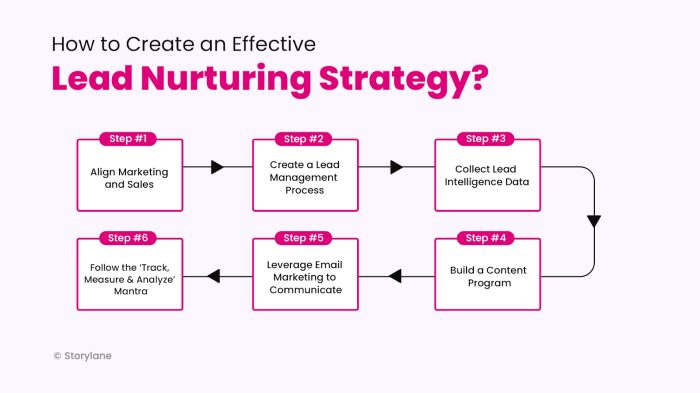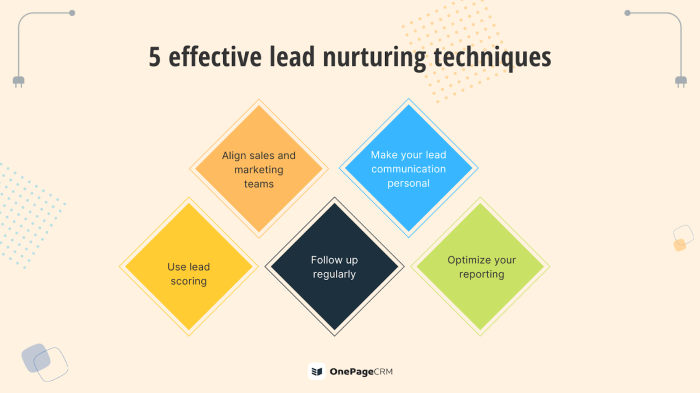Lead Nurturing Techniques sets the stage for successful sales interactions, diving into effective strategies and tools that enhance customer relationships. Get ready to boost your sales game with these expert tips!
Lead Nurturing Techniques
Lead nurturing is a crucial part of the sales process as it involves building relationships with potential customers at every stage of their buying journey. By nurturing leads effectively, businesses can increase conversions, improve customer retention, and ultimately drive revenue growth.
Importance of Lead Nurturing
- Lead nurturing helps to keep the brand top of mind for potential customers, increasing the likelihood of them choosing your product or service when they are ready to make a purchase.
- It allows businesses to provide valuable and relevant information to leads, establishing trust and credibility.
- Effective lead nurturing can shorten the sales cycle by guiding leads through the decision-making process more efficiently.
Effective Lead Nurturing Techniques
- Personalized email campaigns tailored to the specific needs and interests of leads.
- Content marketing strategies such as blogs, whitepapers, and case studies that address common pain points and provide solutions.
- Social media engagement to interact with leads, answer questions, and share valuable content.
Personalized Content for Lead Nurturing
Personalized content is essential for enhancing lead nurturing strategies as it allows businesses to deliver relevant information to leads based on their preferences and behaviors. By segmenting leads and providing content that speaks directly to their needs, businesses can increase engagement and build stronger relationships with potential customers.
Benefits of Automation Tools for Lead Nurturing
- Automation tools can help businesses save time and resources by streamlining the lead nurturing process.
- They allow for personalized communication at scale, ensuring that leads receive timely and relevant information throughout their journey.
- Automation tools provide valuable insights into lead behavior and engagement, allowing businesses to optimize their strategies for better results.
Segmentation Strategies

Segmentation plays a crucial role in lead nurturing by allowing businesses to group leads based on shared characteristics or behaviors. This helps tailor marketing messages and content to specific segments, increasing the likelihood of converting leads into customers.
Different Segmentation Criteria
- 1. Demographic Segmentation: This involves dividing leads based on demographic factors such as age, gender, income, location, etc. Businesses can create targeted campaigns that resonate with specific demographics.
- 2. Behavioral Segmentation: Leads are segmented based on their actions, such as website visits, email interactions, downloads, etc. This helps in understanding lead behavior and providing relevant content at the right time.
Impact of Demographic and Behavioral Segmentation
- Demographic Segmentation: By targeting leads based on demographics, businesses can personalize their messaging and offers to suit the preferences of different customer groups. For example, a clothing retailer may send promotions for winter jackets to customers in colder regions.
- Behavioral Segmentation: Understanding lead behavior allows businesses to send targeted communications that align with the lead’s stage in the buyer’s journey. For instance, sending a demo request to leads who have visited the pricing page multiple times.
Real-world Examples
- 1. Amazon: The e-commerce giant uses both demographic and behavioral segmentation to recommend products based on a customer’s purchase history and browsing behavior.
- 2. Spotify: The music streaming service segments users based on their listening habits to create personalized playlists and recommendations, enhancing user experience and engagement.
Content Personalization

Personalization is a key component of successful lead nurturing strategies. By tailoring content to the specific needs and preferences of individual leads, businesses can significantly increase engagement and conversion rates.
Impact of Personalized Content
- Personalized content creates a more meaningful connection with leads, making them feel valued and understood.
- It helps to build trust and credibility with potential customers, leading to stronger relationships and increased loyalty.
- By delivering relevant content, businesses can address the unique pain points and challenges of each lead, increasing the likelihood of conversion.
Personalized Emails for Increased Engagement
- Use the lead’s name in the subject line and throughout the email to grab their attention and make the message feel more personal.
- Segment your email list based on lead behavior and preferences to send targeted content that resonates with each individual.
- Include dynamic content such as product recommendations or personalized offers to drive engagement and encourage action.
Creating Relevant Content for Different Segments
- Utilize data and insights to understand the unique needs and interests of each lead segment.
- Craft personalized messaging that speaks directly to the pain points and goals of the specific segment you are targeting.
- A/B test different content variations to determine what resonates best with each segment and adjust your approach accordingly.
Using Dynamic Content for Personalization
- Dynamic content allows you to tailor the information displayed to each lead based on their behavior, preferences, and past interactions with your brand.
- By showing relevant content in real-time, you can create a more personalized and engaging experience for leads, increasing the chances of conversion.
- Experiment with different types of dynamic content, such as personalized product recommendations or location-based offers, to see what drives the best results.
Lead Scoring Techniques
Lead scoring is a method used in lead management to rank prospects based on their readiness to make a purchase. This helps sales and marketing teams identify high-quality leads and prioritize follow-up efforts accordingly.
Types of Lead Scoring Models
- Traditional Lead Scoring: Assigning points based on demographic information and online behavior.
- Behavior-Based Lead Scoring: Evaluating leads based on their interactions with content and website.
- Predictive Lead Scoring: Using predictive analytics to forecast which leads are more likely to convert.
Tips for Setting Up a Lead Scoring System
- Collaborate with sales and marketing teams to establish criteria for lead scoring.
- Regularly review and update scoring parameters based on lead behavior and feedback.
- Utilize marketing automation software to track and score leads efficiently.
Benefits of Lead Scoring, Lead Nurturing Techniques
- Improves lead quality and conversion rates by focusing on the most promising prospects.
- Enhances lead nurturing efforts by providing personalized and timely follow-ups.
- Helps sales teams prioritize leads and allocate resources effectively.